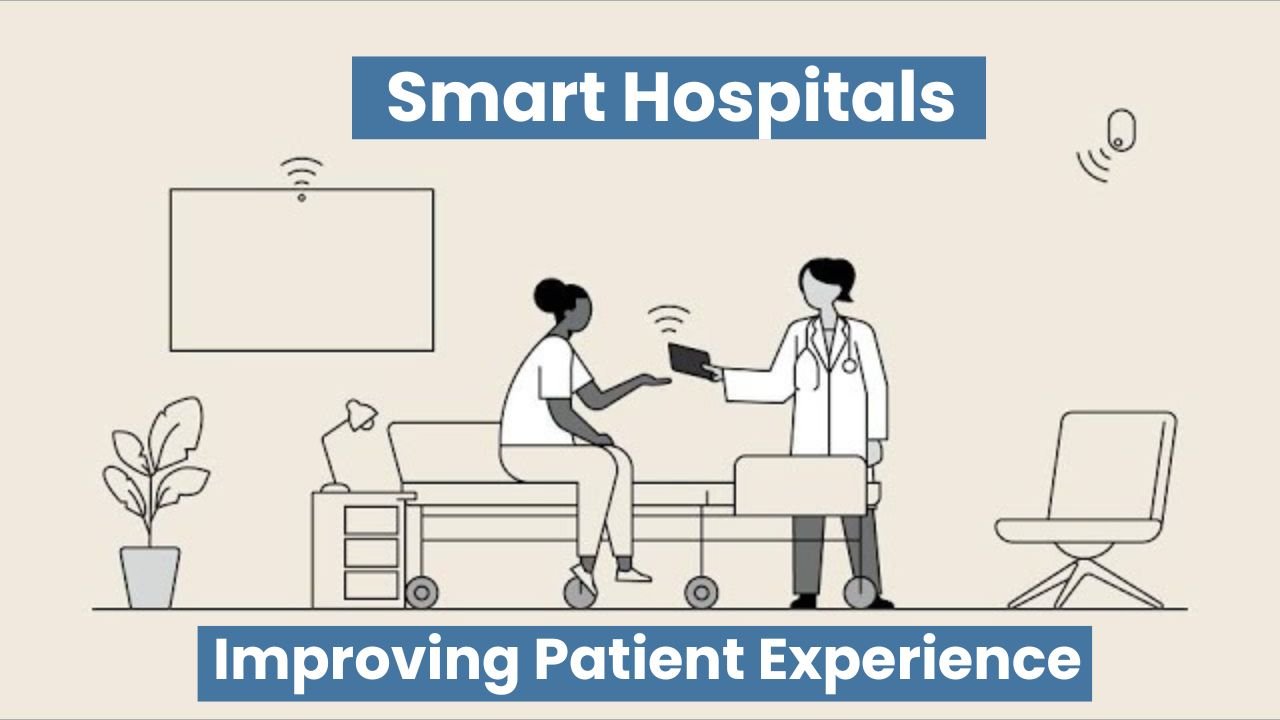Today is the time of technology and innovation. There is change in every field, so how can hospitals stay behind. Now smart hospitals are replacing traditional hospitals, which are becoming modern, fast and patient-friendly centers driven by technology.
Smart hospital does not mean just a building equipped with machines, but a system that gives a better experience to the patients with the help of Artificial Intelligence (AI), Internet of Things (IoT), digital records and automation. These hospitals are playing a big role in making treatment fast, accurate and convenient.
What is a smart hospital?
A smart hospital is different from a traditional hospital in many ways. In this, AI, IoT, digital health records, smart devices and many technical facilities work together.
For example:
While earlier a nurse had to come and check the patient’s condition repeatedly, now the AI-based system itself monitors signals like the patient’s heart rate, oxygen and BP and immediately gives an alarm if any danger is seen.
Even things like hospital registration, delivery of medicines, doctor’s appointment and cleaning become automatic.
Special features of a smart hospital
1. AI-based patient monitoring system
AI-equipped monitoring systems keep an eye on the patient’s condition every moment. As soon as any important change occurs – like falling oxygen levels or fast heartbeat – an alert is immediately sent to the medical staff.
Benefits:
- Help in saving patient’s life
- Immediate action can be taken in emergency
- Staff does not need to check manually again and again
2. Hospital automation
Many tasks are done automatically in smart hospitals, such as:
- Appointment scheduling
- Delivery of medicines
- Room cleaning and sanitization
- Billing and discharge process
This saves time and reduces the chances of human error.
3. Electronic Health Records (EHRs)
Now all the medical information of the patient – such as reports, medicines, X-rays – is in a digital form. This gives the doctor immediate information and there is no delay in treatment.
Example:
If the patient was previously treated at some other place, then his record is available to the new doctor with a single click. This makes the treatment more accurate and faster.
4. Telemedicine services
Smart hospitals are now also providing the facility of telemedicine. That is, the patient does not need to go to the hospital, he can talk to the doctor on video call from home.
For whom it is beneficial:
- Patients from villages or remote areas
- Elderly and disabled people
- Patients who do not come to the hospital frequently for follow-up
5. Smart Health Devices
Now such devices have come that give information about the patient’s body in real time – such as:
- Smartwatch that tracks BP and heart rate
- AI connected X-ray machine that indicates disease
- Blood sugar and oxygen monitor
These devices constantly monitor the patient’s condition and make the treatment personalized.
What are the benefits to patients from a smart hospital?
- Fast and accurate investigation
With the help of AI and data analytics, the disease is identified quickly, so there is no delay in starting treatment. - Less waiting time
Due to automation, tasks like registration, billing and reporting are done quickly. - Personalized Care
Different treatment plans are prepared for the patient based on their medical history and reports. - Treatment from home
With the help of telemedicine, the patient can talk to the doctor from home and continue the treatment. - Real time data
The doctor and staff get the latest information about the patient’s condition immediately, which makes the treatment more effective.
What will be the future of smart hospitals by 2030?
Hospitals will become even smarter in the future. Such as:
- Smart sensors that will monitor the air in the room, temperature and infection
- AI will create a system that will predict the disease before it occurs
- Health reports will be prepared by keeping an eye on the patient’s walking, sitting, eating and drinking
- Machine learning systems will suggest immediate treatment after seeing the symptoms of the disease
Example:
If a patient is repeatedly having trouble breathing, the system will automatically alert the doctor and the oxygen or nebulizer will turn on automatically.
Beneficial for the environment too
Smart hospitals are not only better for patients, but also for the environment:
- Electricity and water are saved
- Paper is used less
- Digital records reduce the need for files and printing
- Automated lights and ACs turn on only when needed
Why choose Continental Hospitals?
Continental Hospitals is one of the few hospitals in India that has adopted smart healthcare. Here there is a great combination of both technology and human service.
Features of Continental Hospitals:
- 24×7 AI monitoring system
- Secure and easy electronic health records
- Telemedicine service, doctor’s advice at home
- Priority given to patient convenience, safety and comfort
- Doctors and staff trained in health technology
If you have a chronic disease, need frequent checkups, or confusion in treatment, then definitely consult Continental Hospitals. Experienced doctors here – like general physicians, cardiologists ophthalmologists, neurologists and gastro specialists – using smart technology to provide precise and personalized treatment to patients.
Conclusion: Smart Hospitals – Now it is the present, not the future
Hospitals are no longer just a place of treatment, but have become a complete healthcare experience equipped with technology. With the help of smart hospitals, treatment is becoming faster, safer, convenient and eco-friendly.
If you want modern, easy and reliable treatment – then smart hospitals are your answer. And in India, institutions like Continental Hospitals have started this.









